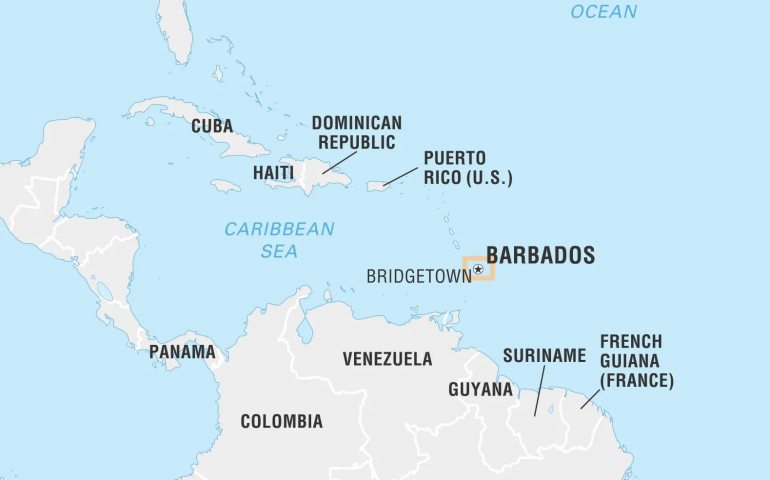Shortening Ṣalāh when ferrying goods in Grenada and Barbados
Question
I reside in Grenada, and many brothers here — as well as in Barbados, Trinidad, and Panama — are businessmen who travel door-to-door for sales. We generally follow a fixed route on specific days. I live in Calliste, St. George’s, Grenada. Every Saturday, I travel up to Maran, St. John’s, which is the furthest point I reach. If travelling directly to Maran via the normal route from Calliste, the distance is approximately 33 km. However, I do not travel non-stop to Maran. From Calliste, I visit many small villages, inner roads, streets, and gaps. By the time I reach Maran, I would have travelled approximately 88 km.
My questions are as follows:
(1) Will I be considered a Sharʿī Musāfir?
(2) If yes:
- Do I have the option to perform Qaṣr Ṣalāh, or is it obligatory upon me?
- In determining Musāfir status, is the distance of the normal route to the final destination considered, or the total distance travelled – even if it includes detours through streets and villages?
- Since each businessman has a unique fixed route, how can one accurately confirm whether they have traveled more or less than 77 km? Can they rely on their vehicle’s odometer or use Google Maps?
بسم الله الرحمن الرحیم
Answer
(1) A person becomes a Musāfir (traveller) when two conditions are fulfilled: He leaves the town and at that point or any point thereafter he intends to travel 48/54.5 miles (77.3/87.8) one way even if it is within the 48/54.5 miles radius by taking a longer route. Therefore, if your route is fixed and your intention is to travel the Sharʿī distance of travel to the furthest point, you will be a Muṣafir.
If, however, your route is not fixed or you are unsure and you do not intend to travel the Sharʿī distance of travel, then you will not be a Musāfir, although your total journey may exceed the Sharʿī distance of travel. On the return, you will not be a Musāfir because you will be travelling home direct and therefore not travelling the Sharʿī distance of travel. If, however, on the return, the distance due to other stops exceeds the Sharʿī distance of travel and you intend to travel this, then you will be a Musāfir on the return journey.
For further details, refer to our earlier answer entitled: Delivery driver and shortening Ṣalāh.
(2a) Once you are certain that you are a Musāfir, then Qaṣr Ṣalāh is necessary in the Ḥanafī school.
(2b) The route that a person intends to use is what is considered. Therefore, if a longer route is taken which exceeds the Sharʿī distance of travel, then this will be considered. Likewise, if there are multiple delivery points within the same village or town and they are all in sequence on the route to the final destination then the distances between these delivery points including the detours will be included in the overall travel distance. However, if after arriving at one starting point in the village or town, there are a few delivery points thereafter in the same village or town and the person returns to the starting point and continues the journey from there, the distances between the few delivery points in the same village or town will not be considered.
(2c) The Odometer can be used; Google Maps can also be used. One must be certain that they have become a Musāfir. It is also worth noting that the preferred view for the Sharʿī distance of travel is 87.8km (54.5 miles), as outlined in an earlier answer entitled: Travel distance: 48 or 54.5 miles.
قال ابن مازه في المحيط البرهاني (٢/٢٣): وفي نوادر بن سماعة: في مصر له طريقان وأحدهما مسيرة يوم والآخر مسيرة ثلاثة أيام ولياليها إن أخذ في الطريق الذي مسيرة يوم لا يقصر الصلاة، وإن أخذ في الطريق الذي هو مسيرة ثلاثة أيام ولياليها قصر الصلاة، انتهى. وقال الكاساني في البدائع (١/٩٤) وابن مازه (٢/٢٣) والحدادي في الجوهرة (١/٨٥): وقال أبو حنيفة: إذا خرج إلى مصر في ثلاثة أيام وأمكنه أن يصل إليه من طريق آخر في يوم واحد قصر، انتهى. وقال الحصكفي في الدر المختار (٢/١٢٣): ولو لموضع طريقان أحدهما مدة السفر والآخر أقل قصر في الأول لا الثاني، انتهى۔
وعن عائشة قالت: فرضت الصلاة ركعتين، ثم هاجر النبي صلى الله عليه وسلم، ففرضت أربعا، وتركت صلاة السفر على الأولى، رواه البخاري (٣٩٣٥) ومسلم (٦٨٥) ومحمد بن الحسن في الموطأ (١٨٩)۔
وجاء في الفتاوى التاتارخانیة (٢/٤۳٦): وفي الفتاوی العتابیة: لو شك في صلاته أنه مسافر أو مقیم یصلي أربعا ویقعد علی الثانیة احتیاطا، انتهی. وأقره في الفتاوی الهندیة (١/۱۳۱). وقال محمد بن الحسن الشيباني في الحجة (١/١٦٦): فلأن يتم الرجل فيما لا يجب عليه أحب إلينا من أن يقصر فيما يجب فيه التمام، انتهى۔
Allah knows best
Yusuf Shabbir
11 Rabīʿ al-Awwal 1447 / 4 September 2025
Approved by: Mufti Shabbir Ahmed and Mufti Muhammad Tahir





